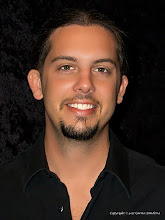Wednesday, February 2, 2011
Don't Forget About Your Ears!
I stumbled upon this YouTube video of famed mix engineer Eric “ET” Thorngren talking about recording and some of the ways he goes about capturing audio. Eric has mixed tracks for Bob Marley, The Talking Heads, Joe Strummer, and Robert Palmer just to name a few. I enjoyed him because of his extremely charismatic way of painting his verbal pictures, and in this way he supported his ears over making audio mixing an exact science. I know what some of you are saying, duh! Really, how many times have you caught yourself with a measuring tape and a calculator trying to capture the best audio possible? I know many times I am guilty of just that. Lately, I have been researching any source I can find to try and expand my mental boundaries with the whole recording process. I have noticed as of late, my mixes are really sounding at least eighty percent better than they were and it made me wonder what I had done differently. I will tell you what it was, the way I was capturing the audio in the beginning. Simple things like gain staging and input levels; along with trusting my ears have made a noticeable improvement in my mixes. It is true that the most important step in recording is the capturing of audio, that is the foundation for your future mix. I started researching older engineers and the techniques they used on the classic albums before and during my youth. The Beach Boys, Robert Palmer, Kenny Loggins, Motown, and all the 50’s and 60’s bands were the sounds that surrounded Mike the kid. All of that older class and great music mixed with my love of the 80’s bands that were closer to my generational taste have produced my personal musical pallet. It surprises me that even with the ease and comfort of recording and mixing in the digital realm, the newer engineers in the industry don’t employee the older techniques more. That long story brings me to the present; I took this though process and started analyzing the rooms I was recording in to optimize captured audio according to the frequency response in different areas of the room. I focused on the frequency diagrams of the microphones I have at my disposal. Recently, I have been recording a lot of voice-overs and radio spots and I used an AT2020 with two Sampson CO2 pencil condensors to pick up sweet spots in the room. I haven’t used more than a peppering of a plug-in style reverb unit in weeks, the room will provide all the reverb you need. These older analogue techniques along with using my ears to do more than numbers and formulas have worked out in spades. However, I agree with what Frank Zappa said, “You must first know the rules before you can break the rules.” I think you should know the ways audio reacts with our environment to be able to make the decisions about the room you will need to make. In the case of Mr. Thorngren, I think sometime the question is best answered by tuning in with your ears, even if you can’t quite explain it in words. Hope you enjoyed this blog, I have grown as an audio engineer by thinking more about this and the way it affects my work. Until next time…
Subscribe to:
Post Comments (Atom)
Subscribe Now
Subscribe via email
Who is Mike Lancaster?

- Mike Lancaster
- I am a drummer and percussionist with twenty-three years experience and a audio engineer. Now I am finishing my Graduate studies for Entertainment Business. I have a Bachelor's Degree in Recording Arts from Full Sail University and I look forward to what life has in store for me in the next years.
What is The Summing Amp?
The Summing Amp is an interactive blog especially for audio engineers and audiophiles in general. I hope everyone who visits will receive something from the blog, but it is geared for professionals in the audio and entertainment industries. I wish to "sum" the information I have in my person and find in my studies onto one stream for my followers. I also wish to have my followers interact with me and the other followers, sharing information and tricks of the trade. I wish most of all to reach the best and the brightest of the industry and share my love for recording, performing, and producing entertainment of many different mediums.

I agree!
ReplyDelete